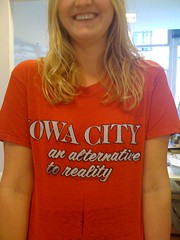Lucky for wannabe urban chicken keepers, the Mankato City Council has decided to give the chicken issue another look in 2010! Good, right? Read on...
Unluckily for wannabe urban chicken keepers, the council is referring to a staff report that contains more hysterical fiction than fact. From Dan Linehan's article in the Free Press:
A staff report on this issue brings up some predictable negatives like smell, proper care and protection from predators.Wait a minute! We've seen these scary (and still unsubstantiated) facts before somewhere, haven't we?
It also says between 20 percent to 50 percent of chicks sold as hens turn out to be roosters.
“These unwanted roosters are often given to animal shelters, released into the streets, and, in a growing number of cases, sold for cockfighting,” the report says.
Companies that sell chicks typically ground up the newborn roosters for feed or fertilizer, according to the report.
Oh yeah, it's the same crap that Animal Sanctuary Coalition who blasted their outlandish Position Statement on Backyard Chickens last December. And it would appear this coalition has managed to brainwash the Mankato staff with a single sensational press release. It smacks of laziness on the city staff's part that they'd take the claims lock, stock and barrel. Yet, the council is able to say (with a straight face) it's "open to revisiting the issue" even though they'd get better inputs from perusing the menu at the local KFC. (or Church's or Popeye's or whatever fries up the chicken parts near you).
I'd love to get my hands on this staff report to see exactly what it claims. But I don't hold out much hope that the Mankato City Council changes their mind if what's described by Linehan in his article is indicative of the kind of preparation they're doing.
Such a shame.
If you could write a press release to help the folks at the pro-chicken Mankato HENS (Hens Enriching Nutrition and Sustainability) what kind of material would you include to counteract the sanctuary coalition's claims?
Photo credit: A.Myers on Flickr







